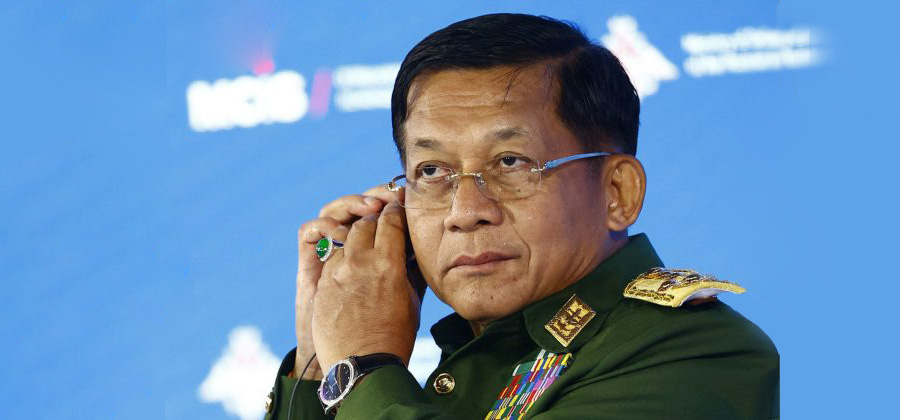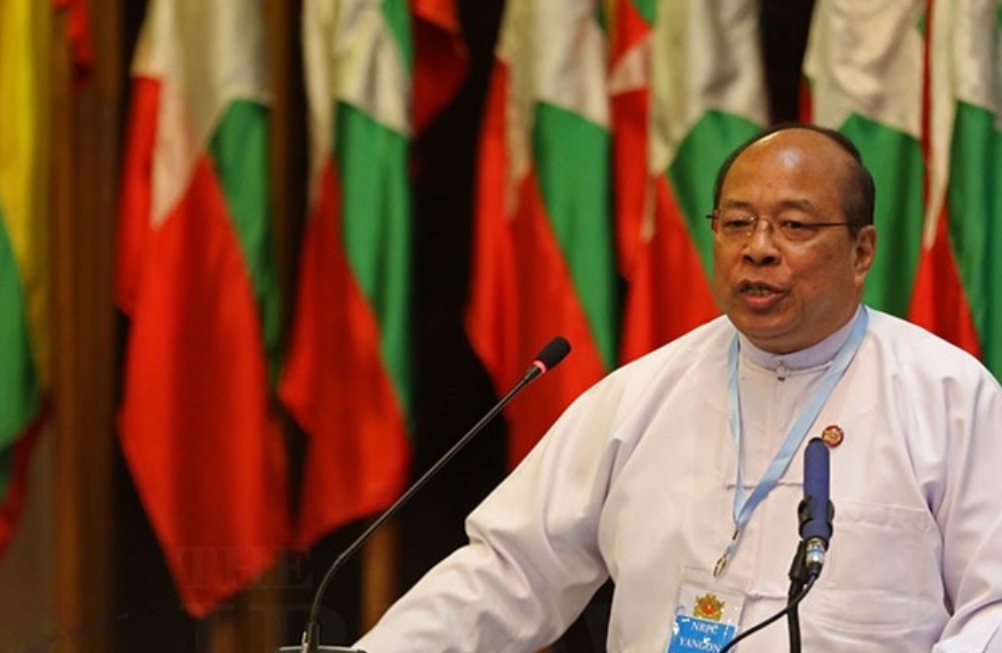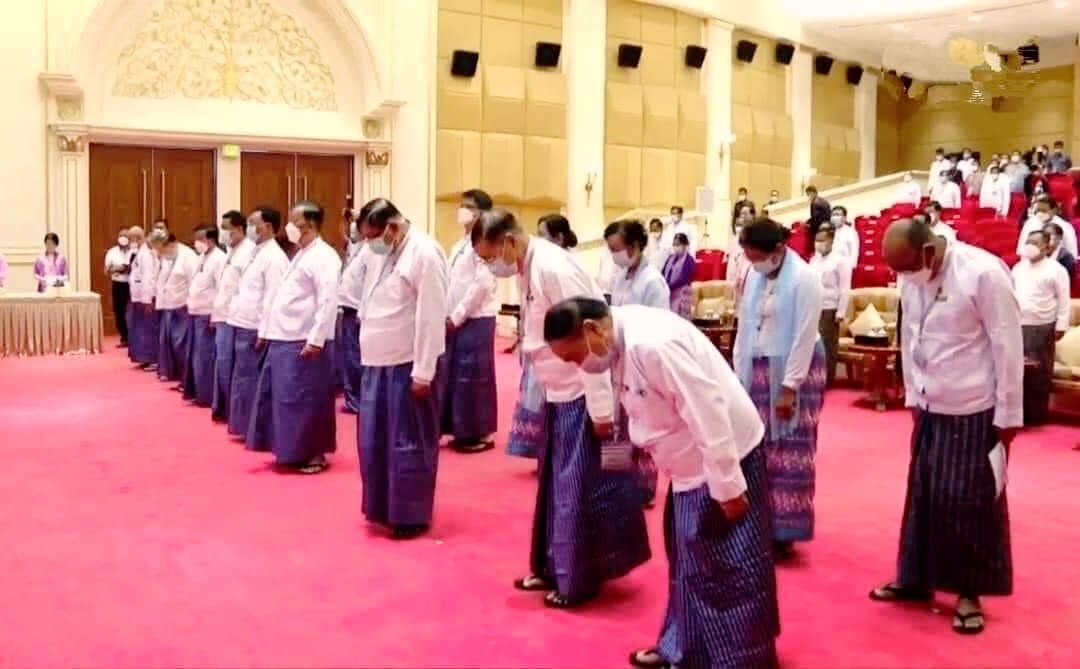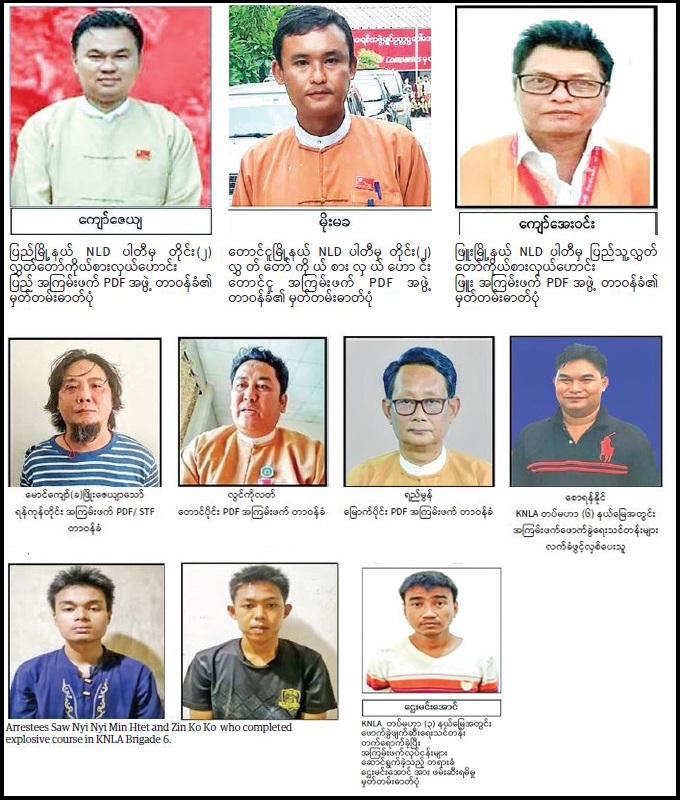This week, the Myanmar military regime’s propaganda machine went into overdrive over the arrest of an ex-NLD lawmaker accused of planning attacks against the junta, even as coup leader Min Aung Hlaing was shunned from two more international summits. It also sentenced 21 young people to death and claimed to support the media despite its record of persecuting journalists, among its other activities.
Regime steps up propaganda after arrest of ex–NLD lawmaker
The military regime has intensified its smear campaign against the civilian National Unity Government (NUG), its legislative body the CRPH and its armed wing the People’s Defense Force (PDF), following the arrest of former National League for Democracy (NLD) lawmaker U Phyo Zeya Thaw, who allegedly masterminded deadly attacks on regime targets in Yangon, along with dozens of civilian resistance fighters.
“Terrorists from the CRPH, NUG and PDF terrorist groups are destroying schools, hospitals, government offices, public buildings, houses, roads and bridges, in addition to the brutal killings of Buddhist monks, teachers, civil servants and innocent civilians across the country,” reported the junta-controlled English-language newspaper Global New Light of Myanmar in an issue from this week.
Other state-owned newspapers Myanma Alinn, Kyemon and military mouthpiece Myawady have been featuring daily updates on what they call the “list of casualties caused by terrorist attacks.” So far the list includes the names of some 240 people the regime says were teachers, Buddhist monks, ward administrators and clerks.
The newspapers also feature a separate list of some 500 education and health facilities and markets allegedly damaged by the PDF, and another list of some 400 roads and bridges, detailing when, where and how they were blown up. Yet another list published on Nov. 26 included the names of 26 state-owned banks and 41 private banks the regime claims were attacked with improvised explosives by PDF groups.
The headlines of the reports misleadingly state that the attacks occurred between Feb. 1 and late November, but the NUG and PDF were not even formed until some two-and-a-half months after the coup.
Coup leader shunned from China-ASEAN Summit, Asia-Europe Meeting

Coup leader Min Aung Hlaing was excluded from the Asia-Europe Meeting (ASEM) on Nov. 25, marking the third time in two months he has been sidelined from an international summit.
Prior to ASEM, he was barred from attending the China-ASEAN Summit on Nov. 22 to commemorate the 30th anniversary of bilateral relations between China and the Association of Southeast Asian Nations.
He was also excluded from an ASEAN summit after he failed to implement the regional bloc’s five-point consensus.
China wanted to invite Min Aung Hlaing to the annual China-ASEAN summit but the regional grouping objected. His exclusion cost Min Aung Hlaing an opportunity to present his narrative of the military takeover to Chinese President Xi Jinping and other regional leaders, and, more importantly, an opportunity to claim legitimacy for his regime.
On the other hand, his absence saved state leaders from regional countries from having to listen to a lot of nonsense, thus enabling them to focus on other important issues. The regime said nothing about their leader’s absence from the China-ASEAN Summit.
Junta files corruption charge against former investment minister

The military regime brought a corruption charge against U Thaung Tun, who served as minister of investment and foreign economic relations under the ousted civilian government, on Nov. 23, alleging that he rented government-owned land in Yangon to a company at below the market rate.
U Thaung Tun, who was also a national security adviser and chairman of the Myanmar Investment Commission, has been detained since the Feb. 1 coup. He served as Myanmar’s ambassador to Washington, Geneva, New York and Brussels under the former military regime.
Following the coup, the regime named U Aung Naing Oo as the new head of the Investment and Foreign Economic Relations Ministry. Coincidentally, the ex-military officer served as the ministry’s permanent secretary under U Thaung Tun, under the ousted civilian government.
Regime convenes Security, Peace and Stability and Rule of Law Committee
State Administration Council (SAC) chairman Min Aung Hlaing chaired the sixth meeting of the Security, Peace and Stability and Rule of Law Committee on Nov. 23.
At a glance it seems the SAC just held a regular meeting on security affairs. But it is important to note that the meeting was held five days after the arrest of former National League for Democracy (NLD) lawmaker U Phyo Zeya Thaw.
Significantly, junta media only published a summary of the meeting; after other high-level meetings, they have reported every word uttered by the coup leader.
However, given the latest developments, there can be no doubt that the meeting discussed ways of stepping up the junta’s fight against urban guerillas and PDF groups.
Young people accused of killing junta-appointed administrators sentenced to death
In an attempt to threaten potential opponents, junta tribunals on Nov. 23 sentenced to death 21 anti-coup activists who allegedly killed administrators and an alleged military informant in Yangon’s South Dagon Township and Dagon Seikkan Township, where the regime has imposed martial law.
In April, the regime handed its first death sentence since its February coup. Nineteen people—18 men and a woman—from Yangon’s North Okkalapa Township were given the death sentence for allegedly attacking two junta soldiers.
Junta leader claims to recognize Fourth Estate while oppressing media

Hypocritically, the junta leader, who has ordered bans on several independent media outlets and arrested dozens of journalists, said on Nov. 24 that he recognized the media as the Fourth Estate of the country, as the new members of the Myanmar Press Council took oaths before him.
Just one month after the coup, the regime revoked the publishing licenses of five media outlets. Some media agencies were raided and dozens of journalists were detained at their offices or homes or while covering anti-regime protests and some were charged with high treason and terrorism for doing their jobs.
Currently, some 50 journalists remain under detention with press freedom being increasingly restricted. The regime has reconstituted the Press Council since its coup. New chairman U Ohn Maung, a poet who goes by the pen name Myinmu Maung Naing Moe, is a former lieutenant colonel and won several national literature (poetry) awards under the previous military regimes. The new vice chair, U Myo Tun, a poet and writer going by the pen name Maung Sein Naung (Lewe), was formerly a captain at the Directorate of Public Relations and Psychological Warfare of the Defense Ministry. However, general readers are unlikely to have heard of these two so-called men of letters.
KNU organizes military training with NUG support, junta says

The regime’s Myawady TV said on Nov. 25 that Myanmar’s oldest autonomy-seeking revolutionary group, the Karen National Union (KNU), had organized military training for civilian resistance forces with the support of the country’s shadow National Unity Government in areas under the group’s control in the southern part of the country. Based on information extracted during interrogation of 20 people arrested for attacks on regime targets, it said the brigades 1,2,3,5 and 6 of the KNU’s armed wing, the Karen National Liberation Army (KNLA), offered the training, gave shelter to those evading arrest by the regime and supplied arms to groups engaged in urban guerrilla warfare in a number of cities and towns in the country. The KNU signed a peace deal with the government in 2015 but denounced this year’s coup and, following the military’s crackdowns on protesters, launched attacks on regime bases in the country’s south. The junta retaliated with air strikes, causing thousands of civilians to flee. The regime’s official naming of the KNU as supporters of a civilian resistance movement against it may herald more attacks on the Karen armed groups in the near future, as the junta has been intensifying its crackdowns on the civilian resistance.
You may also like these stories:
Shoppers Boycott Myanmar Plaza After Attack on Anti-Regime Protest
Chin State Town Blames Myanmar Junta for Arson Attacks
In Another Snub, Myanmar Junta Barred From Asia-Europe Meeting

















